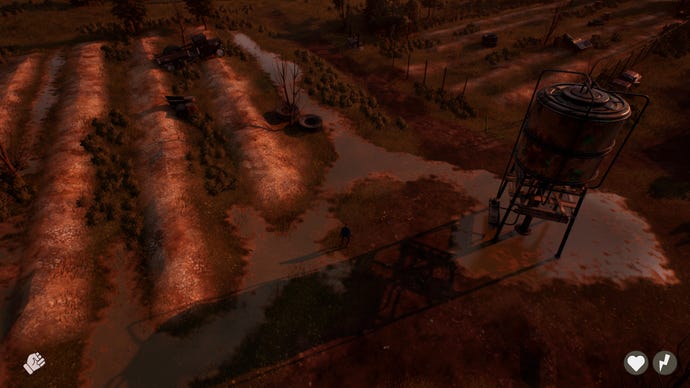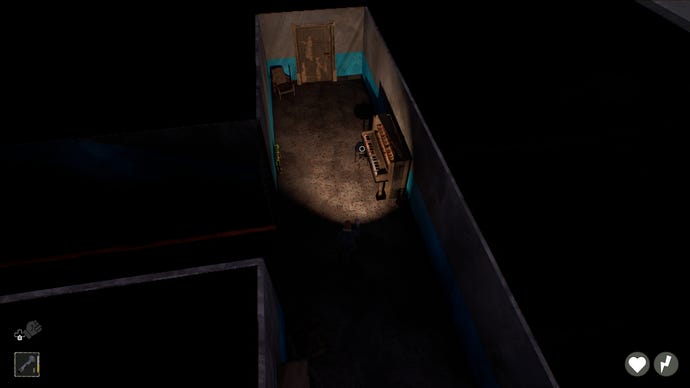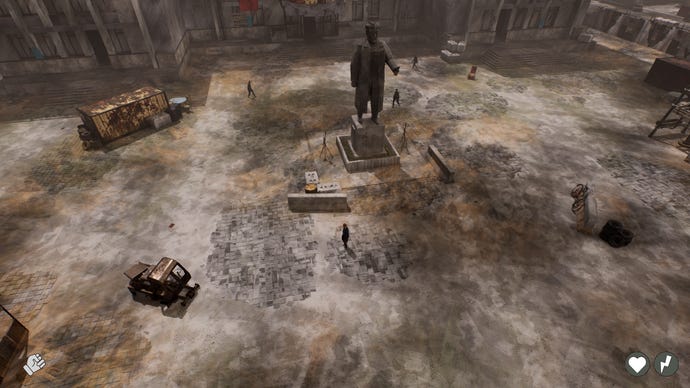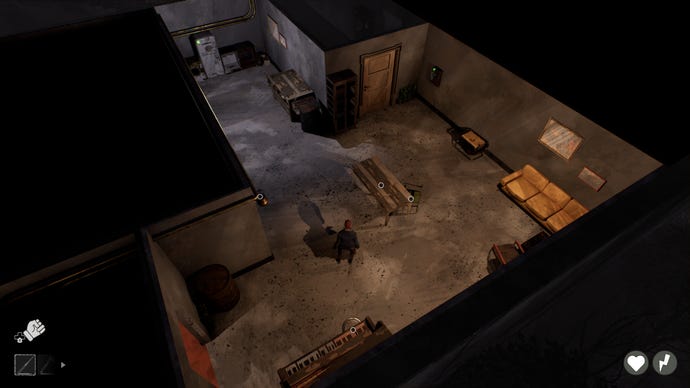
Survival game City 20 is The Sims set in the world of S.T.A.L.K.E.R.
I find myself turned off these days by simulations that claim endless butterfly effects. I think my doubts can be boiled down to “a chain of dominoes is still a chain of dominoes, even if its range is 1000 meters”. Regardless of the narrative or broader question of subject matter and aesthetics, it all runs the risk of seeming admirable in execution, but also like sheer technical maximalism – system for the sake of system. Why do I care if I can topple the 567th domino with the first kick?
Still, I'm very interested in seeing more of City 20. In development since 2018, it is the work of Untold Games, a studio best known so far for VR projects, location-based “immersive experiences”, and ports of games like Journey to the End. Wild Planet. As a piece of mechanics, it's a top-down sandbox survival experience with highly responsive environments and procedural storytelling, influenced by the likes of Rimworld (and not, the developers insist, latter-day generative AI. is created using the tool). Meanwhile, as a story scenario, it is inspired by Cold War conspiracy theories about Soviet “secret cities” assigned to uranium enrichment and nuclear experiments. The titular City 20 is one such burger, although it's not a direct recreation. As the game begins, a nuclear accident has caused increased radiation and a partial evacuation: you play as one of the poor guys who didn't take the last bus out of town.
City 20 – Feature Trailer
Fast forward a few years, and City 20 has been shut down and essentially turned into a petri dish for the full spectrum of human empathy and malevolence, where the butterfly effects are multiplied by, like, er. , rabbits, who will wander around on their own accord. Food availability and predator behavior. A new society has arisen within the quarantine zone, as is the case with quarantine zones – a washed-up Mad Maxian civilization, divided into factions of frontier scientists and former soldiers with their own belief systems, their own histories of disaster. Is. Their own views about the outside world. The look of the place combines Eastern European cities as well as hints of Polish painters and sci-fi films of the 70s and 80s. It also features a soundtrack of electronic music inspired by music such as Kraftwerk. This is certainly a layered depiction, although I'm not sure most of the details will be clear from the stratospheric default perspective.
Your task here is first to survive, and then find a way out. To achieve these goals, you will need to interact with the people around you, each of whom has needs and desires that give rise to a series of daily activities. Take your local baker. They will need wood for their ovens, which they can trade or get directly by going into the forests with an axe. Once they can fire up the oven, they can open their bakery and deliver some loaves of bread to people, improving the quality of life for everyone else. If they can't find wood – perhaps because you've already gone out and cut down the nearest trees yourself – they'll try to meet their needs in other ways. For example, they might go mushroom picking. If they are somehow injured and killed in the process, perhaps because a storm comes and they are stranded far from shelter, the local community will organize a funeral and look for a new baker. Perhaps eventually you will handle this task yourself. Each iteration of City 20 has a limited number of citizens and once they are gone, they are gone, leaving a hole in the world that can either be filled or compensated for or Can be left to rot.
The relationships between characters also determine how they behave. A merchant who doesn't really know you can't show you his full inventory, or tell you everything useful about the local area. Naturally, you can improve someone's opinion of you by doing him a favor – which can make even an enemy lose respect for you. Start a fight, and bystanders can also join the fight or instigate it, depending on how they feel about the instigators and how brave or stupid they are. Ruling factions have different ideas about crime and punishment, some issue fines for misdeeds while others expect you to repay your debt to society, and still others beat you up on the spot.




While it can be difficult to trace each procedural ricochet, many choices have consequences that scale across your environment. If a generator breaks down, depriving the neighborhood of light after sunset, the faction in charge will seek the resources to fix it, and will deploy patrols to protect the generators in the future. If you or someone else burglarizes a house, the owner will barricade the windows. Put poison in a well, and you might come back to find half the locals dead and the well under lock and key.
All of these effects seem to apply whether your character is actually present at the time or is sleeping in a hut somewhere. A civil war can break out in a city over some small issue, putting everyone else in danger. Perhaps most interestingly, the Untold games seek to simulate how knowledge travels, with townspeople sharing secrets and gossip based on who they trust. And that's just human geography: In forests, there is an overlapping ecosystem of plants that grow from seeds spread by other plants, and populations of animals with specialized dietary requirements and associated migration patterns.
City 20 will launch into Early Access this year with two of the four planned factions. The first major update will introduce a proper seasonal cycle with corresponding temperature changes for plant growth. As a project, it's certainly a lot, and I suspect some of the more detailed ideas here will get lost during development. But I appreciate the ambition in the show, especially from a team without much of a reputation for original projects, and I'm hopeful that all these moving parts will lead to stories that feel like much more than just another set of dominoes. Do what's been waiting to fall.











